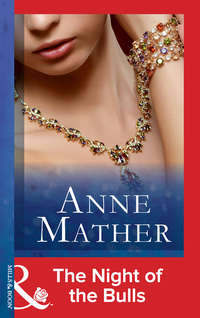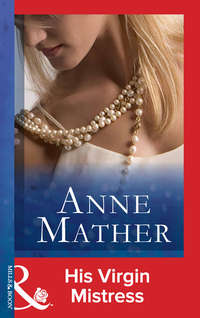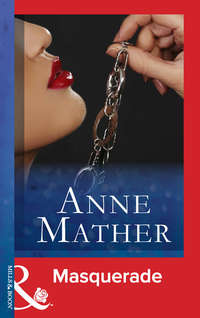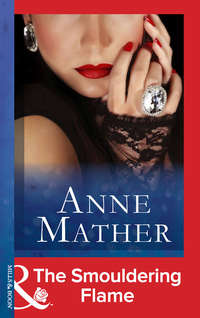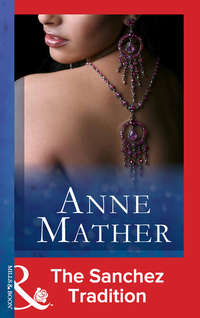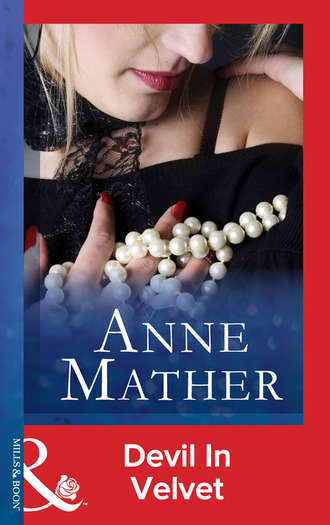
Полная версия
Devil In Velvet
‘Harriet!’ he said incredulously. ‘Mon dieu, Harriet, is it really you?’
CHAPTER TWO
HARRIET stood as if frozen to the spot. She was aware of Susan coming up the path to stand behind her, of her touching her arm and whispering: ‘Who is it? Harriet, do you know him?’ But she made no immediate reply. She was too stunned. Too shocked. Too lacking in control of her vocal cords to allow anything to escape them which might reveal to this man exactly what finding him here had done to her. Did she know him? Oh, God! she thought vehemently, if only she didn’t. If only she had never met him! But that still didn’t explain what he was doing here.
It helped to hold tightly on to her handbag, and as her eyes adjusted themselves to the light she was able to see him clearly. Without his instant recognition of her, she wondered if she would have recognised him; and then dismissed the thought as unworthy of her intelligence. Of course she would have recognised him. He had not changed so very much, except perhaps that he was thinner, and in consequence the lines of his face were more deeply drawn. There were more streaks of grey in his hair than she remembered, but why not? It had been eight years, after all, and he must be what? Forty—forty-one, now? Maybe even forty-two. Yet his hair was still predominantly dark, and presently overlapped the collar of the rough shirt he was wearing. He had obviously been cleaning out the grate, and his hands and forearms were blackened with soot; so he made no attempt to touch her, just looked at her with those dark, heavy-lidded eyes she remembered so well.
‘Harriet,’ he said again. ‘I did not know it was you!’
‘What was me?’
The words came out sharp and staccato, not at all like her usual husky tones, and his dark brows lifted interrogatively.
‘I did not realise you were the purchaser of the house,’ he explained simply. ‘What did you think I meant?’
Harriet chose not to answer this, and glancing round nervously at Susan, made a feeble introduction: ‘This is Monsieur Laroche, Susan. He—I—we met some years ago, in Paris. At—at an auction.’
This was such a travesty of the truth that Harriet was half afraid he might contradict her, but she ought to have guessed he would not commit himself so far.
‘How do you do, Susan?’ He inclined his head politely, displaying his dirt-grimed hands. ‘I regret I am unable to offer a salutation. My apologies.’
Susan smiled a trifle uncertainly, looking to Harriet for guidance, and her aunt cleared her throat. ‘You still haven’t explained what you’re doing here—monsieur,’ she prompted abruptly, and suffered the full strength of his gaze upon her.
‘Did I not? But then I would have thought it was obvious. I am afraid I have to offer apologies for the state of the house, but my excuse is that I did not learn until yesterday that Frond had in fact found a buyer.’
‘You mean—’ Harriet stared at him aghast. ‘You mean, you were the previous owner?’
‘That is correct.’
Harriet could hardly believe it. But then she could hardly believe any of this. Even Laroche himself was far removed from the sophisticated man she had met in the St Germain salerooms in Paris. The clothes he had worn then had been immaculate and expensive, fitting his lean body as only expert tailoring can. Now of course she had to make allowances for the fact that he had been cleaning out the grate, but nothing could alter the fact that the shirt he was wearing was made of rough homespun, and the tight-fitting jeans that moulded the powerful muscles of his legs were worn and shabby.
‘You lived—here?’ she echoed faintly, feeling a growing revulsion for the place if this were so, but he shook his head.
‘No, I did not say that. I live—well, a few kilometres from here, but when I learned from Frond that the house had been sold, I realised he could have no conception as to the state it was in.’
Harriet heaved a sigh. ‘I see.’
A sudden crackling from within made him turn his head swiftly, and excusing himself he went back to attend to the sticks which were burning brightly in the grate. Harriet exchanged a helpless look with Susan, and then followed him.
The room seemed smaller with his presence by the fireplace. But she noticed that the debris had been swept away, and some attempt at cleaning the table and wooden seats had been made.
‘You did this?’ she asked disbelievingly, and he nodded.
‘I swept upstairs yesterday evening,’ he explained, feeding more wood on to the flames, ‘but I did not have time to attend to everything. As you can see, it is very primitive.’ He paused, but when she made no comment, he straightened to stand facing them again. ‘You may look around, of course, but if you feel the house is not what you were led to believe, I shall quite understand. Naturally, I cannot blame Frond, but I can instruct him to refund your payment immediately.’
Susan looked anxiously up at her aunt. Laroche’s English was much better than Harriet’s French, and there was no mistaking his meaning. Susan’s feelings were unmistakable, too.
‘As—as a matter of fact we were here earlier,’ Harriet admitted reluctantly. ‘We looked around then.’
‘Ah.’ He did not look surprised. ‘I thought I had not locked the door.’
Harriet gasped. ‘You have a key!’
His expression grew wry. ‘But of course. I have just told you. I did not know Frond had sold the place.’
‘Well, if we’re staying here, naturally I shall expect you to surrender it,’ stated Harriet stiffly, and his mouth revealed a decidedly cynical twist.
‘Naturally,’ he assured her mockingly, and she felt the betraying heat enveloping her neck. It made her aware of the low cleavage of her blouse, and of how dishevelled she must appear. Until then, she had been so absorbed with his appearance, she had paid little heed to her own.
Now her fingers went automatically to secure that revealing button, and as if aware of her discomfort, he turned away once more to check the fire. With the shadows of dusk darkening the lane outside, the fire was a cheerful sight, and like the setting sun earlier, its bright reflection gave the room an unexpected charm. With the beams swept clean of dust, and a fresh coat of emulsion on the walls, it might not look half bad, thought Harriet in a moment of weakness, but the house was no longer the deterrent; the man facing the hearth had taken its place.
Susan tugged at her sleeve. ‘We are going to stay, aren’t we?’ she mouthed desperately, and Harriet made an impatient gesture. ‘Please!’
Susan was determined, but Harriet refused to be blackmailed. All right, so it had been her idea to bring her niece away for a couple of months until all the trauma of her parents’ death had died down, but if he—she refused to think of him by his Christian name—if he was prepared to give her her money back, there was absolutely no reason why she shouldn’t buy another house, or a cottage, in another part of the country entirely. Yet she had always loved this area, and she had wanted to stay.
But that was before she had known who her neighbours might be. How could she stay here, only a stone’s throw from him and his family? How could she bear to know that she might run into him at any time—into him, or his wife! Besides, he might view her presence here as an open invitation to take up where he had left off, and that he would never do. Never! Even so, his presence here puzzled her, and she wondered how long he had undertaken menial tasks himself.
‘There! That seems to be burning satisfactorily,’ he observed at last, and moved to the sink to rinse his filthy hands. ‘Are you planning to spend the night here?’
Harriet wrapped the strap of her handbag round her wrist. ‘We were,’ she conceded shortly. ‘We—we did go into the village, looking for an inn, but a Monsieur—Macon—?’
‘Macon, oui?’
‘—he told us there were no inns hereabout.’
‘No, that is true,’ he nodded. ‘Although recently an American company have been trying to buy the chateau to turn it into a luxury hotel.’
‘The Chateau de Rochefort?’ inquired Harriet involuntarily, and he frowned.
‘You have been there?’
‘Oh, no.’ She shook her head. ‘We just thought… It doesn’t matter.’ She gave Susan a thoughtful look, and then added: ‘Perhaps we could let you know tomorrow whether—well, whether we intend to stay.’ She consulted her watch. ‘It’s getting rather late, and we’re hungry.’
He dried his hands on a handkerchief he pulled out of his jeans pocket. It was not new but it was spotlessly clean, and she found herself speculating exactly what his position was. His circumstances were intriguing, even if he deserved whatever kind of retribution this might be, she thought maliciously.
‘How will you sleep?’ he asked, thrusting his handkerchief away again. ‘The bed upstairs is not fit to use.’
‘I don’t think that need concern you, Monsieur Laroche,’ Harriet retorted coldly, and had the satisfaction of seeing a faint trace of colour darken the brown skin covering his cheekbones.
‘I did not mean to pry,’ he said quietly, and she felt reproved. But before she could make any further comment, he added: ‘If you do decide to stay, I will supply you with two single beds to take the place of the one upstairs, which must be destroyed.’
Harriet did not thank him. After all, she justified herself angrily, the house had been sold furnished, and no one could argue that a bed was an absolute necessity.
‘Where’s the cooker?’ Susan asked suddenly, and Harriet glanced round impatiently.
‘There is no cooker—at present,’ Laroche told them. ‘Some years ago, the oven beside the fire was the only facility, but the last tenants of the house were provided with a Calor gas stove. Unfortunately it was removed some months ago. I will see that it is restored also if you choose to stay.’
Harriet sighed. ‘But how can we make a hot drink?’ she protested, momentarily shaken out of her incommunicative state, and he indicated an iron kettle on the hearth.
‘I regret you will have to boil water in that for this evening,’ he said. ‘Unless…’ He paused, his eyes probing Harriet’s. ‘Unless you care to join my family and myself for supper?’
How dared he?
Harriet dragged her gaze away from his feeling a sick awareness in the pit of her stomach. How could he invite her to share his supper, to sit at the same table as his wife and family, in the full knowledge of their previous relationship?
Almost choking on the words, she refused his invitation, and he moved his shoulders in a way that betrayed his Gallic ancestry. ‘As you wish,’ he acceded equably, and moved towards the door. ‘I will return in the morning for your decision.’ He indicated the lamp hanging from the ceiling. ‘There is oil inside. Can you light it?’
Harriet straightened her spine. ‘I should think so, monsieur. Goodnight.’
‘Bonsoir,’ he responded politely, and with a brief smile at Susan, he left them, striding away down the path to the lane.
Harriet waited until he reached the lane, and then hastened to the window, hushing Susan when she tried to speak to her, and watching which direction he took. He turned away from the road which ran between Bel-sur-Baux and Rochelac, and instead, entered the copse of trees that ran down to the stream, confirming Harriet’s speculation that one could walk to the village that way. She waited until he had disappeared from sight, and then sank back against the wall, one hand pressed quellingly to the nervous pulse throbbing in her throat.
Susan stared at her for several seconds, and then she asked impatiently: ‘Who is he? What’s going on?’
Harriet straightened, shaking her head. ‘I’ve told you. He—I—we met several years ago in Paris.’
‘Is he in the antique business, too?’ exclaimed Susan in surprise.
‘I don’t know.’
‘But you said you met him at an auction!’
‘We did.’ Harriet flapped her hand about dismissingly. ‘Look, we haven’t time to talk about it now. It will be dark soon, and we still have the car to unload.’
Susan regarded her sulkily. ‘You can’t brush it off, just like that. You didn’t just meet him once, did you? I’m not a baby. I could tell there was more to it than that.’
‘Oh, Susan…’ Harriet walked out of the house.
‘Well! What went wrong?’ demanded Susan, following her. ‘I mean, he’s rather dishy, isn’t he? He reminded me of Sacha Distel.’
‘Oh, good lord, he’s nothing like Sacha Distel!’ said Harriet crossly. ‘Are you going to help me carry these things in, or not?’
Susan shrugged, and lifted a box of groceries. ‘Did you have an affair with him?’ she asked casually, and for a moment her aunt was too stunned to speak. ‘Well,’ she went on, carrying the groceries into the house. ‘People do, you know. I even know girls of my age who—’
‘I’d prefer not to discuss the matter any further,’ Harriet essayed, depositing their sleeping bags on the kitchen table. ‘Now, do you want tea or coffee? It’s all the same to me.’
‘Well, at least tell me his name,’ exclaimed Susan, looking at her appealingly, and Harriet sighed.
‘Why?’
‘I’d just like to know, that’s all. I’ll stop asking questions if you tell me, honestly.’
Harriet hesitated. ‘Will you?’
‘Yes. Yes, I promise.’
Harriet bent over the box of groceries. ‘His name’s André. André Laroche. Now, can we please get some work done?’
The kettle, after a scouring at the sink, boiled remarkably quickly, and cold ham and cheese, with some of the crusty bread from the patisserie, went down very well with hot coffee. With the lamp lighted, and the door closed against the encroaching darkness outside, it was all rather cosy, and Susan said so.’
‘We haven’t sampled the delights of washing in cold water yet, and remember, there’s no bathroom,’ Harriet observed ruthlessly. ‘Did you see the privy when you went down to the stream?’
Susan nodded ruefully. ‘It’s just outside the back door, actually.’
‘Chemical, of course?’ Susan nodded, and Harriet grimaced. ‘Oh, well, I can hardly blame anyone for that. I knew the conditions would not measure up to what we were used to, but—’
‘We are going to stay, aren’t we?’ Susan broke in eagerly. ‘It’s not as bad as you expected, is it? And if André Laroche provides us with two single beds…’
‘Monsieur Laroche to you,’ Harriet corrected her sharply, and then went on brusquely: ‘I don’t know what I’m going to do, Susan. If—if Monsieur Laroche is prepared to give me my money back, I might be well advised to take it.’
‘Oh, no!’
Susan was aghast, and Harriet spread her hands helplessly. ‘We—I can buy another house, Susan. Somewhere else. Somewhere—less—isolated.’
‘But I like it here!’ declared Susan, pushing her fringe out of her eyes, and Harriet caught her lower lip between her teeth.
It was at times like these that her niece most resembled her mother. Unlike Harriet, Sophie had been red-haired, with the blue eyes her daughter had inherited. Harriet’s hair was much fairer, although her skin was not, and she had never had the problems with tanning that Sophie had suffered. Harriet’s eyes, too, were firmly brown, and therefore stronger than Susan’s slightly myopic vision.
It was this weakening memory of her dead sister that made Harriet hesitate now, when all her instincts urged her to get rid of the house while she could, and leave Rochelac before she was forced into a situation she would regret.
‘Susan… Susan…’ she began persuasively, but her niece had her father’s strength of will.
Facing her aunt stubbornly, she said: ‘You promised me we would stay here. You said you’d always wanted to spend time in the Dordogne, exploring the castles and the caves! Now you’re changing your mind. And all because of that man!’
‘That’s not true!’ Harriet’s cheeks were red now. ‘Susan, you know I had serious doubts about this place the minute I saw it.’
‘But you’d come back, hadn’t you? You were going to give it a chance. Until you met André Laroche!’
‘Susan!’
‘I don’t believe you don’t like the house. We could make it super, and you know it. What’s wrong? Did he walk out on you or something? Is that why you’re still an old maid at twenty-six!’
As soon as the words were uttered, Susan regretted them, and she threw her head down on her folded arms and began to sob as if her heart would break. Harriet let her cry for a while, realising there was more behind her tears than disappointment at her indecision. Susan was by no means recovered from the shock of both her parents being killed in a multiple pile-up on the M1 six weeks ago, and perhaps she was being unreasonable in imagining she could shunt the child about wherever the fancy took her. After all, she could have met André again any time, at any one of a dozen sales she had visited in France since. Perhaps it was a good idea to exorcise his ghost once and for all. Certainly the memory of that period of her life had cast a shadow over all subsequent relationships to the extent that Susan was not altogether unjustified in calling her an old maid. Only Charles got anywhere near her, and their association was governed by a mutual love of antiquities.
At last she got up and went across to the girl, sliding an arm about her shoulders. Susan uttered a muffled apology, and buried her face against her, sniffing and groping blindly for her handkerchief. But the storm was over, and presently she lifted her head and looked sheepishly up at her aunt.
‘I’m sorry.’
‘Don’t be silly.’ Harriet spoke cheerfully. ‘I’m not offended. You could be right—about me being an old maid, I mean.’
‘But you’re not,’ protested Susan vehemently. ‘You’re just devoted to your career, that’s all. All my friends think you’re terribly sophisticated, and your clothes are always so—elegant. You’re not a bit like—Mummy, I mean—you’ve never shown any interest in getting married or having a family, have you? But I expect you’ve known heaps of men…’
‘You make me sound like a selfish bitch!’ remarked Harriet, her smile hiding the pain the child’s words had unknowingly inflicted. If only Susan knew, she thought bitterly, if only she knew!
‘Well, anyway, that’s what I want, too,’ Susan insisted loyally. ‘I don’t want to get married until I’m thirty, at least. I’m going to make a career for myself first.’
Harriet turned away to carry their empty cups to the sink. Outside it was completely dark now, and insects attracted by the light, were beginning to throw themselves against the murky glass of the window. She had Sellotaped pieces of cardboard over the broken panes, and now, watching some of the hairy-legged moths making their futile attacks, she was glad she had. She was no lover of insects in any form.
‘Where are we going to sleep?’ asked Susan, apparently prepared to leave the question of what Harriet intended to do until the morning, and her aunt frowned.
‘In here, I think,’ she decided thoughtfully. ‘The air in the salon is definitely musty, and I’d like to be sure all the corners have been swept out before lying down in there.’
‘All right.’ Fully recovered now, Susan unrolled the sleeping bags, and spread them out before the fire. ‘Can I miss having a wash tonight? I feel too sleepy.’
Harriet nodded her agreement. ‘All right. Do you want to go outside first, or shall I?’
‘I’ll go,’ Susan offered with a grin. ‘I’ll make sure there are no spiders lurking about. At least that’s one thing I’m good for!’
An owl hooted as Harriet let herself back into the house a few minutes later, and she suppressed the hysterical laughter that welled up inside her. Why was it she had never anticipated what it might be like after dark? she wondered, securing the bolt with a definite feeling of relief.
For all she was tired, Harriet did not sleep well. She had too many things to think about, not least what she intended doing next day. Susan, lying curled up in her sleeping bag beside her, obviously had no such anxieties, and Harriet envied her her ability to leave her problems to solve themselves.
But where did that leave her? What could she do, knowing how distressed Susan would be if she insisted on selling the house? And how long might it take to negotiate another sale even if her money was instantly forthcoming? Charles had only given her eight weeks’ leave of absence, and besides, Susan had to return to school in September.
There seemed nothing for it but to remain where she was, however distasteful to her that might be. It was only eight weeks, and surely, once they were satisfactorily settled there would be no need for them to see André Laroche. It wasn’t as if they had any rent to pay, and no doubt his wife would soon object if he started paying undue attention to the new owners. Was she so unsure of herself and her feelings that she must succumb to the absurd and cowardly notion to flee? The past was dead; the pain she was experiencing was the vulnerability of an old wound that had suddenly been scratched by a heavy and insensitive hand. And like all injuries, exposure to the air might effect the swiftest cure. But nothing could convince her that she would ever feel anything but hatred and contempt for the man who had awakened her so rudely to the cruel facts of life.
CHAPTER THREE
HARRIET was awakened by the sound of Susan running water into the iron kettle. Somehow, she had managed to rake over the embers of the fire without disturbing her aunt, and with the aid of some dry twigs and the torn-up cardboard boxes in which they had carried their crockery and groceries, she had succeeded in rekindling the fire to boil some water for breakfast.
Harriet stirred sleepily, aware that apart from a certain stiffness in her spine, she felt reasonably refreshed. Outside, the birds had already set up a morning chorus, and the smell of blossom from the garden was scenting the air with its fragrance. Everything seemed less sombre with the sun filtering in through the grubby panes, although its brilliance again illuminated the rooms’ shortcomings.
She had not undressed, and now she wriggled out of her sleeping bag feeling distinctly hot and sticky, reflecting ruefully that Susan’s description of her the night before was now far from accurate.
‘You sleep well,’ her niece remarked cheerfully, setting the kettle squarely on the flames, and Harriet refrained from revealing that it had been well into the early hours before she had closed her eyes.
‘Did you?’ she asked instead, getting to her feet and wrapping up the sleeping bag, and Susan nodded vigorously.
‘Like a log,’ she exclaimed. ‘It must be the air. Hmm!’ She took a deep breath at the open doorway. ‘Isn’t it divine?’
Harriet tied the sleeping bag into its roll and set it on the table. ‘That stream,’ she ventured thoughtfully, ‘do you think it’s very shallow?’
‘Our stream?’ Susan was eager. ‘I shouldn’t think it’s very deep, if that’s what you mean.’
Harriet grimaced. ‘Could I wash there, do you think? I feel awfully grimy, and I want a thorough wash before I change my clothes.’
Susan shrugged. ‘I’ll go and see, if you like.’
‘No.’ Harriet shook her head. ‘No, don’t bother. I’ll go myself. Did we unpack any towels last night?’
Armed with soap and towel, toothbrush and paste, Harriet opened the door which led into the tangled garden at the back of the house. Like the front, it was overgrown with shrubs and weeds, but as she trampled her way towards the sound of the water as it tumbled over its rocky course, she saw the remains of what had once been a herb garden, and smelled the delicious fragrance of mint and rosemary.
The stream was clear and fast-running, and Harriet felt almost inclined to taste it, but she decided not to take any chances. Instead, she took off her sandals and dipped her feet into its chilly shallows, smiling as the coldness tickled her toes. Downstream a short way, a cleft in the rock formed a small pool, and Harriet thought longingly of submerging her sticky body. Washing was all very well, but there was nothing to compare with taking a bath, and after assuring herself that she was completely alone, she stripped off her shirt and pants, and plunged bodily into the water. Sitting on the sandy bottom, the water lapped coolly about her breasts, and she soaped herself luxuriously, enjoying herself as she had not done since she was a child. In her apartment in London, she had a large modern bathroom, with a step-in bath and shining chrome-plated shower, and she had forgotten what it was like to enjoy the simple things of life. Her parents’ home in Surrey was the same, with every kind of labour-saving device, from washing machines to central heating. But sitting here she couldn’t help wondering whether they were not losing more than they gained.


